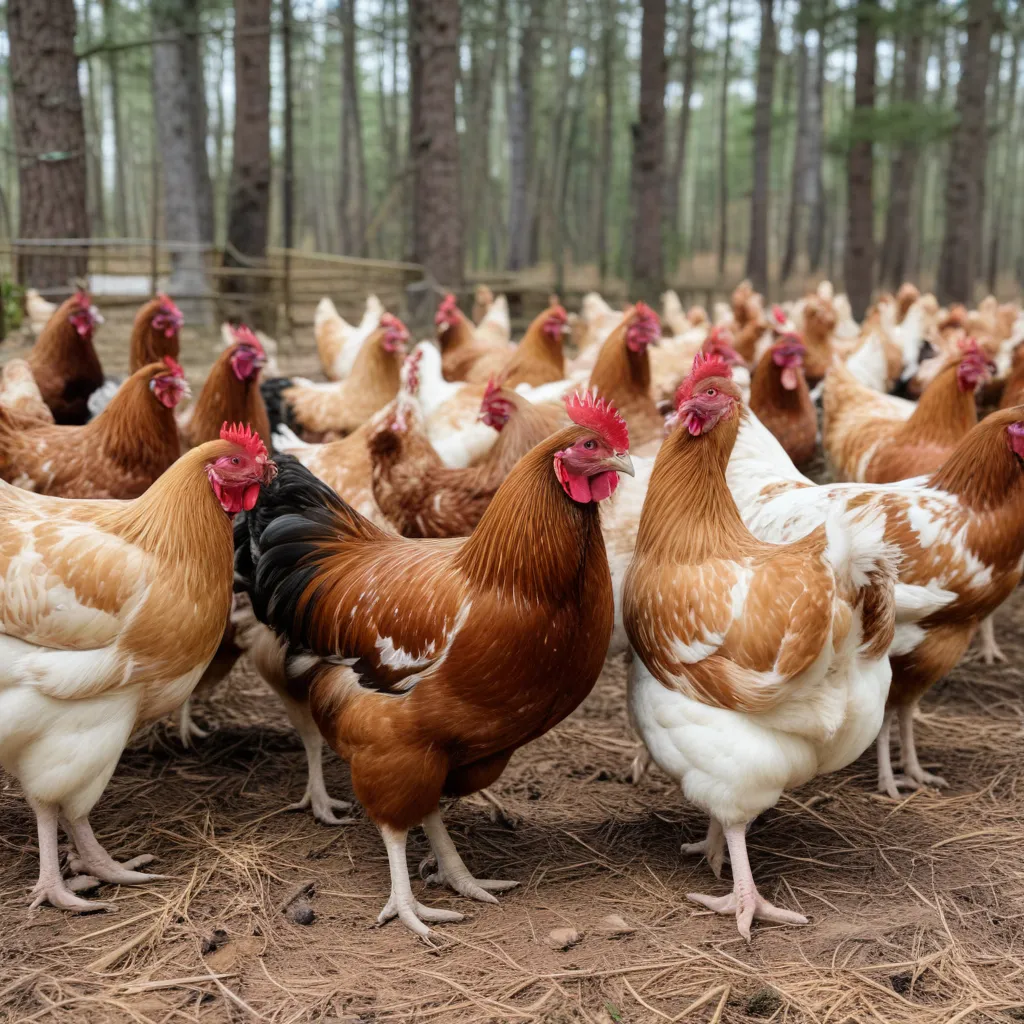
Crooked Pines Farm is home to a vibrant and varied flock of laying hens, each with their own unique personalities and contributions to our farm’s thriving ecosystem. As a farm educator, I’m excited to take you on a journey exploring the remarkable qualities of these remarkable birds.
Hen Breeds and Characteristics
Our hens represent a diverse array of heritage breeds, each with fascinating traits that have been cultivated over generations. From the bold and inquisitive Australorps, known for their impressive egg production, to the docile and friendly Orpingtons, whose large bodies and soft feathers make them excellent foragers. We also keep a number of Rhode Island Reds, prized for their hardy nature and rich, dark-brown eggs.
One of the true gems in our flock are the stunning Marans, whose deep chocolate-colored eggs add visual interest and culinary delight to our farm-to-table offerings. But perhaps most unique are our Faverolle hens, with their distinctive “bearded” faces and fluffy, almost-bear-like feathers. These gentle giants are not only a feast for the eyes, but also remarkably adept at navigating our hilly, wooded terrain.
Habitat and Housing
At Crooked Pines, our hens enjoy a spacious and enriching environment. Their custom-built mobile coops are strategically moved around our pastures, allowing the birds ample opportunities to forage, dust-bathe, and roam freely. The coops themselves are designed with their comfort in mind, featuring nesting boxes, roosting bars, and shaded areas to escape the summer sun.
Beyond the coops, our hens have access to lush, diverse foraging areas, where they can indulge in a varied diet of insects, greens, and natural supplements. This diverse ecosystem not only keeps our hens happy and healthy, but also contributes to the exceptional flavor and nutrient density of their eggs.
Feeding and Nutrition
Speaking of nutrition, the diet of our laying hens is a carefully curated blend of organic, non-GMO grains, protein-rich legumes, and nutrient-dense greens harvested right from our own gardens. We supplement their diet with a selection of quality, sustainable feeds that support optimal egg production, vibrant yolk color, and overall hen well-being.
In addition to their balanced diet, our hens have access to a variety of grit and calcium sources, which are essential for strong eggshells and healthy bone development. We also provide them with a constant supply of fresh, clean water, ensuring they remain hydrated and energized throughout the day.
Health and Welfare
At Crooked Pines, the health and welfare of our hens is of the utmost importance. We work closely with a local veterinarian to monitor for any potential issues and administer preventative care, such as routine dewormings and vaccinations. By prioritizing the well-being of our flock, we ensure they can thrive and continue to provide us with their exceptional, nutrient-dense eggs.
Should any of our hens require additional medical attention, our team is equipped to provide the necessary care and support. We believe that by fostering a healthy, stress-free environment, our hens will be able to live out their natural lifespan and contribute to the continued success of our farm.
Egg Collection and Storage
Collecting eggs from our hens is a daily ritual that we approach with care and attention. Each morning, our team gently gathers the freshly laid eggs, taking great care to minimize any disruption to the hens. The eggs are then washed, graded, and stored in a temperature-controlled environment to maintain their exceptional quality and shelf-life.
Our commitment to maintaining the highest standards extends to our egg packaging and labeling. Each carton is carefully sealed and adorned with the Crooked Pines Farm logo, ensuring our customers can trust the provenance and quality of the eggs they’re purchasing.
Marketing and Sales
Speaking of our customers, Crooked Pines is known for our direct-to-consumer sales model, allowing us to build lasting relationships with the families and individuals who enjoy our farm-fresh eggs. Whether through our on-site farm stand, local farmers’ markets, or subscription-based delivery, we take great pride in sharing the bounty of our hens’ labor with our community.
By engaging directly with our customers, we’re able to not only educate them about the exceptional qualities of our eggs, but also learn from their feedback and preferences. This collaborative approach helps us continually refine our practices and ensure we’re meeting the needs of our discerning clientele.
Sustainable Practices
Underpinning all of our efforts at Crooked Pines is a steadfast commitment to sustainable and regenerative agriculture. From our manure management and composting systems to the energy-efficient design of our mobile coops, we strive to minimize our environmental impact and cultivate a thriving, diverse ecosystem.
By closing the loop on our farm’s waste and energy usage, we’re able to enrich our soil, reduce our carbon footprint, and provide our hens with a truly regenerative environment. This holistic approach not only benefits the health and well-being of our flock, but also ensures the long-term sustainability of our farm for generations to come.
Community Engagement
As a farm educator, I’m passionate about sharing the remarkable story of our laying hens with the wider community. Through our on-farm tours and educational outreach programs, we invite families, students, and curious visitors to witness firsthand the magic that happens at Crooked Pines.
Whether it’s hosting interactive workshops on chicken behavior and care, leading nature walks through our diverse foraging areas, or collaborating with local organizations to promote sustainable food systems, we’re committed to inspiring the next generation of engaged, earth-conscious individuals.
By fostering this deep connection between our farm and our community, we’re not only showcasing the exceptional quality of our eggs, but also the vibrant, living ecosystem that sustains them. It is our hope that through these meaningful interactions, more people will be inspired to support local, regenerative agriculture and appreciate the vital role that laying hens play in our shared food system.


